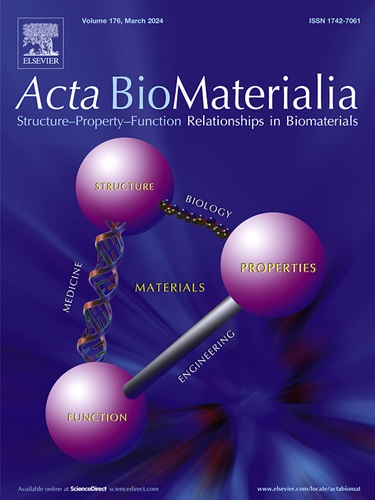Engineered probiotics remodel the intestinal epithelial barrier and enhance bacteriotherapy for inflammatory bowel diseases
IF 9.4
1区 医学
Q1 ENGINEERING, BIOMEDICAL
引用次数: 0
Abstract
Inflammatory bowel diseases (IBDs) are often associated with compromised epithelial barriers and dysregulated gut microbiota. In this study, we revealed the synergistic effect that zinc and indole-3-carbinol (I3C) have in restoring the epithelial barrier, and co-localized them on a ZI platform, which was further conjugated to the surface of Escherichia coli Nissle 1917 (EcN). The ZI@EcN formulation effectively delivered ZI to colon tissues and extended its retention in the intestines due to the colonic colonization effect of EcN, thereby promoting the sustained release of zinc and I3C for optimal synergistic effects on epithelial barrier remodeling. The restored epithelium acts as a protective barrier, preventing the infiltration of toxins and pathogens, which significantly reduces inflammation in colonic tissues. Additionally, EcN enriched the gut microbiome, increasing the abundance of beneficial bacteria while reducing that of pathogens, demonstrating its significant efficacy in gut microbiome regulation. In dextran sulfate sodium-induced mouse colitis models, ZI@EcN exhibited substantially improved prophylactic and therapeutic efficacy with favorable safety profiles, highlighting its potential for clinical applications.
Statement of significance
This study highlighted the synergistic effects that zinc and indole-3-carbinol, both derived from dietary sources, have on restoring integrity of the intestinal epithelial barrier. A platform (ZI@EcN) was also developed for the targeted delivery and sustained release of zinc and indole-3-carbinol, specifically in colonic tissues, for colitis treatment. This platform not only restores the compromised intestinal epithelial barrier but also regulates the dysbiotic gut microbiota, promoting the recovery of a healthy intestinal microenvironment and showing promise in alleviating complex symptoms in a single formulation. Furthermore, the formulation demonstrated potent prophylactic and therapeutic efficacy against colitis, with favorable safety profiles, and a strong potential for clinical applications.

工程益生菌重塑肠上皮屏障,增强炎症性肠病的细菌治疗
炎症性肠病(IBDs)通常与上皮屏障受损和肠道微生物群失调有关。在这项研究中,我们揭示了锌和吲哚-3-甲醇(I3C)在恢复上皮屏障中的协同作用,并将它们共定位在ZI平台上,该平台进一步偶联到大肠杆菌Nissle 1917 (EcN)的表面。ZI@EcN配方通过EcN的结肠定殖作用,将ZI有效递送至结肠组织,延长其在肠内的滞留时间,从而促进锌和I3C的持续释放,达到对上皮屏障重塑的最佳协同作用。修复后的上皮作为保护屏障,防止毒素和病原体的浸润,从而显著减少结肠组织的炎症。此外,EcN丰富了肠道微生物群,增加了有益菌的丰度,同时减少了病原体的丰度,表明其在肠道微生物群调节中的显著功效。在葡聚糖硫酸钠诱导的小鼠结肠炎模型中,ZI@EcN显示出显著改善的预防和治疗效果,并具有良好的安全性,突出了其临床应用潜力。这项研究强调了锌和吲哚-3-甲醇的协同作用,它们都来源于饮食来源,对恢复肠上皮屏障的完整性具有协同作用。还开发了一个平台(ZI@EcN),用于靶向递送和持续释放锌和吲哚-3-甲醇,特别是在结肠组织中,用于结肠炎治疗。该平台不仅可以修复受损的肠上皮屏障,还可以调节肠道菌群失调,促进健康肠道微环境的恢复,并有望通过单一配方缓解复杂症状。此外,该制剂显示出对结肠炎的有效预防和治疗效果,具有良好的安全性,具有很强的临床应用潜力。
本文章由计算机程序翻译,如有差异,请以英文原文为准。
求助全文
约1分钟内获得全文
求助全文
来源期刊

Acta Biomaterialia
工程技术-材料科学:生物材料
CiteScore
16.80
自引率
3.10%
发文量
776
审稿时长
30 days
期刊介绍:
Acta Biomaterialia is a monthly peer-reviewed scientific journal published by Elsevier. The journal was established in January 2005. The editor-in-chief is W.R. Wagner (University of Pittsburgh). The journal covers research in biomaterials science, including the interrelationship of biomaterial structure and function from macroscale to nanoscale. Topical coverage includes biomedical and biocompatible materials.
 求助内容:
求助内容: 应助结果提醒方式:
应助结果提醒方式:


